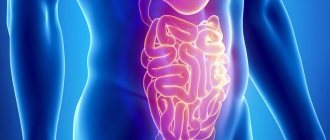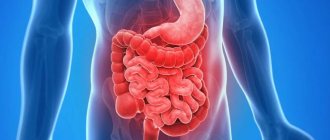Can constipation cause fever?
This question is not posed entirely correctly. An increase in temperature is a protective reaction of the body to various inflammatory processes or disruption of any vital functions. One of the natural daily needs of a person is to rid the body of the remnants of processed food. Retention of stool (and especially long-term) has a very negative effect on health, and temperature during constipation indicates a pathology that has arisen in the gastrointestinal tract.
When you need to see a doctor urgently if you have a fever due to prolonged constipation
Conditions of periodic constipation that can be eliminated by changing the diet do not require urgent medical attention. However, the symptoms that arise cannot be ignored; consultation with a doctor is still necessary to determine the correct tactics of behavior when changing lifestyle (nutrition, physical activity, amount of physical activity).
Treatment of constipation with fever should be entrusted to a doctor; independent actions can aggravate the course of the inflammatory process. You should immediately consult a doctor if:
1 constipation cannot be managed for more than 3 days, despite the use of laxatives;
2 with strong straining, bloody streaks are released from the anus;
3, against the background of difficulty in defecation, body temperature rises significantly (above 38°C).
Cause or effect
Increased temperature with constipation, both in adults and children, can be associated with:
- with inflammatory processes of the intestinal walls, which can be caused by a violation of the evacuation function of the body;
- with intoxication when decay products of feces enter the bloodstream and are not removed from the body in a timely manner;
- with an illness accompanied by fever and causing stool retention;
- with recent surgery;
- with decreased immunity.
If the temperature rises with constipation, then before starting treatment, you need to figure out what is the cause and what is the effect. In one case, the body temperature will stabilize after the regularity of stool is normalized, and in the other it will decrease only after the disease that caused constipation has been cured.
Pathologies associated with fever and difficulty defecating
Constipation and fever are often manifestations of diseases such as:
- Appendicitis. With acutely developing inflammation of the appendix, a temperature of 38 degrees or higher is not uncommon; this is due to the release of toxins from the pathological focus. Constipation with appendicitis develops less frequently than diarrhea, but it may well occur in both adults and children.
- Viral infection. Infection with pathogenic microorganisms leads to activation of the immune system, while hyperthermia allows the destruction of microbes. The highest peak in temperature rise occurs during viral infection in the first two to three days of illness, then it gradually normalizes. Constipation with respiratory infections does not develop immediately, but as a consequence of dehydration and sometimes due to taking a number of medications.
- Cholecystitis, pancreatitis, gastritis. The temperature in these diseases can last for several days during the period of exacerbation of pathologies. Constipation is caused by errors in nutrition and deterioration in the functioning of the gastrointestinal tract.
- Intestinal obstruction. The disease occurs due to blockage or compression of the intestines. This leads to a pronounced inflammatory process, which occurs with high fever, general intoxication, severe cramps and abdominal pain. Constipation can be either complete or partial, that is, stool is released in a small volume.
- Dysbacteriosis. Changes in the microflora of the digestive organs negatively affect the digestion of food and the functioning of the large intestine, which becomes the cause of constipation. Dysbacteriosis also affects the reduction of the protective barriers of the immune system, so the temperature can increase even with minor inflammation.
- Diverticulosis of the large intestine. This disease is a common cause of constipation in adults. The pathology is characterized by the formation of sac-like protrusions in the walls of the organ, which is facilitated by age-related changes in the connective tissue and frequent overstretching of the organ. Diverticulosis is manifested by pain, constipation and periodic hyperthermia.
In addition to the listed diseases, high fever and constipation are often manifestations of helminthiases, food allergies, and irritable bowel syndrome. All pathologies are manifested not only by constipation and hyperthermia; an accurate diagnosis is made only after a complete diagnosis.
Causes of constipation not associated with concomitant diseases
Constipation with fever can occur with:
- improper, irregular or unbalanced diet (for example, insufficient fiber and plant fibers in the foods consumed);
- a sharp change in the set of products included in the usual diet (for example, during a vacation or business trip);
- insufficient amount of fluid consumed daily;
- sedentary lifestyle;
- emotional stress or nervous shock;
- violation of the diet regimen (for example, prescribed by a nutritionist).
Normalization of temperature during constipation in adults, as a rule, occurs after the body resumes regular bowel movements. If this does not happen, then you need to contact specialists for help. Only they will be able to conduct the necessary tests and recommend medications to treat the consequences of constipation (residual intoxication or inflammation of the gastrointestinal tract).
Features of body temperature during constipation
Currently, the optimal values of body temperature vary from 36.6 o C to 37.1 o C, taking into account the individual characteristics of the body. It is under these parameters that the basic biochemical processes necessary for normal life are possible.
Its increase, in turn, most often indicates the presence of an inflammatory process, intoxication, or as a consequence of the impact of physical factors on the body - extensive injuries, foreign bodies, burns and frostbite. Under these conditions, pathogenic microorganisms cannot reproduce and die.
Main reasons
Temperature with constipation in adults may increase due to the following reasons:
- Presence of intoxication. As is known, reabsorption of water occurs in the final sections of the intestine. Therefore, with prolonged stagnation of feces, decay products, toxins and other substances that should have left it with feces return to the body along with it. Their entry into the bloodstream is characterized by the fact that the temperature begins to rise to an average of 37.5o C.
- Intestinal obstruction. In this case, the name speaks for itself. Peristalsis critically slows down or stops altogether, while the food bolus stops moving through the gastrointestinal tract, accumulating in it. The main symptoms of this terrible condition are severe cramping pain in the abdomen, constipation, lack of gas discharge, bloating, vomiting and an increase in body temperature up to 38o C.
- Appendicitis. Sometimes constipation and fever are the only symptoms of acute inflammation of the appendix against the background of migrating abdominal pain.
- Paraproctitis is caused by the involvement of peri-rectal tissue in the process of inflammation, which is manifested by sharp pain in the anus and soft tissues of the perineum, high fever, a feeling of chills, and impaired defecation and urination.
Exacerbation of chronic hemorrhoids. Feces passing through the rectum damage the thinned mucous membrane at the nodes. These wounds are entry points for the penetration of microbial agents, of which there are plenty in the digestive tract. Therefore, an inflammatory process can be suspected by an increase in temperature.- Intestinal tuberculosis. This disease can affect not only the respiratory system, but also the digestive system, and it is even more severe. The body temperature rises with constipation, and the passed stool often contains blood impurities.
- Dysbacteriosis. The temperature rises with constipation, caused by a violation of the balance of flora in the intestines, which can occur with the abuse of laxatives or after treatment with antibacterial drugs.
- Hormonal imbalance. The rise in body temperature here may not be associated with digestive pathology, but with the direct cause of the disease.
- Worm infestation. Extensive infestation of the gastrointestinal tract with parasites can lead to weight loss even with increased nutrition. The body responds with a hypersensitivity reaction, which in some cases leads to the temperature becoming higher than normal. But for the most part, helminthiasis occurs asymptomatically for many years.
- Other gastrointestinal diseases are irritable bowel syndrome, nonspecific ulcerative or granulomatous colitis.
- If constipation occurs due to the presence of foci of chronic infection or weakened immunity, the body temperature may also rise.
The only situation when constipation and fever can be considered normal is the early postoperative period, especially after surgery on the colon. The combined appearance of fever and constipation in an adult, associated with completely different reasons, cannot be ruled out.
Associated symptoms
In almost all cases, constipation appears at a high temperature against the background of other symptoms of a causally significant disease.
These include the following clinical manifestations:
- Abdominal pain of varying localization, intensity and character;
- Enlargement of the abdomen, bloating, flatulence;
- The patient does not want to eat and begins to lose weight;
- Heartburn, nausea, vomiting;
- Anemia (manifested by general weakness, pallor of the skin and mucous membranes, dizziness, loss of consciousness);
- Rare passage of small portions of hard feces of the “sheep” type (in lumps);
- Pain during or after bowel movements;
- The presence of pathological impurities in the stool - mucus, blood, pus;
- In the chronic course - problems with the skin (acne, pustules), nails and hair;
- Drowsiness, apathy;
- Increased thirst that is not quenched by drinking water;
- Emotional lability;
- Tenesmus (painful urge to defecate).
Complications
A prolonged increase in temperature can cause irreversible changes in the central nervous system, including damage to the respiratory center. At the same time, all internal organs, especially the heart, liver and kidneys, experience enormous stress.
We should also not forget that any of the diseases that cause an increase in body temperature due to constipation has its own formidable complications, among which the following stand out:
- Intestinal perforation;
- Bleeding;
- Peritonitis;
- Sepsis;
- Severe dehydration;
- Formation of adhesions and fistula tracts;
- Acute renal failure;
- Stopping breathing and cardiac activity.
In order to avoid life-threatening consequences in time, you must immediately consult a doctor, undergo an examination and receive the indicated treatment.
Symptoms accompanying hyperthermic stool retention
The period of illness (which undoubtedly is constipation) may be accompanied by:
- drowsiness;
- muscle weakness;
- heaviness in the stomach;
- nausea or vomiting;
- headache.
The above symptoms lead to a deterioration in appetite, and, as a result, to weight loss. At the same time, the psycho-emotional state of a person also suffers.
Symptoms of constipation with fever
The clinical course of chronic constipation, accompanied by an increase in temperature, is manifested by more pronounced symptoms. The patient's general condition deteriorates significantly; frequent complaints are:
Recipes, menus and diet products
- Muscle weakness.
- Constant fatigue.
- Drowsiness.
- Nausea.
- Vomit.
- Headache;.
- Increased thirst.
In addition, vomiting, fever, and constipation are often accompanied by a complete lack of appetite and weight loss. There is also increased sweating and emotional instability. Against the background of the absence of bowel movements, a feeling of distension of the abdomen appears. Periodic urges to defecate result in nothing or partial release of feces (sheep feces), which often contains mucus and blood.
Constipation and fever, abdominal pain are the main symptoms of irritable bowel disease. Often an increase in temperature is observed in the presence of inflammatory processes in the mucous membranes of the colon.
Recipes, menus and diet products
Diseases that can cause constipation
The cause of constipation accompanied by high temperature can be various diseases (appendicitis, viral infections, gastritis, cholecystitis, dysbacteriosis, allergies) or prolonged use of medications used during their treatment. Moreover, it is quite difficult to find out on your own what caused the temperature increase. The course of any of the above diseases may be accompanied by hyperthermia. And stool retention is only a concomitant complication. Therefore, even after resuming the frequency of bowel movements (which you achieved using medications or folk remedies), in order for the body temperature to return to normal, it is necessary to continue treatment of the underlying disease.
If you have constipation, acute abdominal pain and high fever, then treatment of such a “bouquet” is best carried out after appropriate consultation with a specialist.
Features of the condition
An increase in temperature is a sign of an inflammatory process in the body. Constipation delays substances that should leave the body in a timely manner, but as a result they are absorbed into the blood and lead to general intoxication. Some infections can also lead to persistent constipation: dysentery becomes the initiating factor in the appearance of a feeling of internal heat and the development of intestinal obstruction in an infected person.
Against the background of stool retention, dehydration often develops - dehydration, which tends to lead to an increase in body temperature.
Drug treatment
Medical experts recommend self-administration (without prior consultation) of oral laxative medications only in emergency cases (for example, in case of sudden, one-time constipation). Among the most common and popular drugs (which are produced both in tablet form and in the form of syrup) are Senade, Laxacodil, Duphalac, Bisacodyl, Fitolax.
Important! Almost all remedies for constipation have medical contraindications, so before using them you should carefully read the instructions.
Anal medications to normalize bowel movements act only on dense feces accumulated in the rectum and do not in any way affect the organs of the digestive system located above. Therefore, they are most suitable for independent use. A very convenient, fast-acting and very effective remedy for constipation is the disposable microenema "Microlax". Although, if a pharmacy is temporarily unavailable (for example, at a dacha or on a camping trip), it can be successfully replaced with a regular syringe with warm water.
Another popular way to get rid of constipation (in both adults and children) are rectal suppositories made on the basis of glycerin (which has a gentle effect on the mucous membrane, stimulates the functioning of the rectum and is practically not absorbed by the body).
Pathologies associated with fever and difficulty defecating
Constipation and fever are often manifestations of diseases such as:
- Appendicitis. With acutely developing inflammation of the appendix, a temperature of 38 degrees or higher is not uncommon; this is due to the release of toxins from the pathological focus. Constipation with appendicitis develops less frequently than diarrhea, but it may well occur in both adults and children.
- Viral infection. Infection with pathogenic microorganisms leads to activation of the immune system, while hyperthermia allows the destruction of microbes. The highest peak in temperature rise occurs during viral infection in the first two to three days of illness, then it gradually normalizes. Constipation with respiratory infections does not develop immediately, but as a consequence of dehydration and sometimes due to taking a number of medications.
- Cholecystitis, pancreatitis, gastritis. The temperature in these diseases can last for several days during the period of exacerbation of pathologies. Constipation is caused by errors in nutrition and deterioration in the functioning of the gastrointestinal tract.
- Intestinal obstruction. The disease occurs due to blockage or compression of the intestines. This leads to a pronounced inflammatory process, which occurs with high fever, general intoxication, severe cramps and abdominal pain. Constipation can be either complete or partial, that is, stool is released in a small volume.
- Dysbacteriosis. Changes in the microflora of the digestive organs negatively affect the digestion of food and the functioning of the large intestine, which becomes the cause of constipation. Dysbacteriosis also affects the reduction of the protective barriers of the immune system, so the temperature can increase even with minor inflammation.
- Diverticulosis of the large intestine. This disease is a common cause of constipation in adults. The pathology is characterized by the formation of sac-like protrusions in the walls of the organ, which is facilitated by age-related changes in the connective tissue and frequent overstretching of the organ. Diverticulosis is manifested by pain, constipation and periodic hyperthermia.
In addition to the listed diseases, high fever and constipation are often manifestations of helminthiases, food allergies, and irritable bowel syndrome. All pathologies are manifested not only by constipation and hyperthermia; an accurate diagnosis is made only after a complete diagnosis.
Folk remedies
Folk remedies for normalizing stool are very effective, safe to use and non-addictive. The risk of allergic reactions when consuming them is minimized (after all, for repetition, you yourself can choose only the recipe that does not contain ingredients that cause you an allergy).
The simplest folk remedies for constipation:
- A mixture of carrot, beet and cucumber juices in a ratio of 3:1:1. The recommended dose is half a glass before meals or several sips throughout the day.
- A cocktail (consisting of apple and beet juice in a 2:1 ratio) is a very effective remedy in the fight against constipation. 200 ml should be drunk before the first meal.
- Cucumber pickle (1-1.5 glasses), drunk on an empty stomach, will help normalize stools within 2-3 hours.
- By infusing a teaspoon of flaxseed in 200 ml of boiling water for 30-40 minutes, you will get a very effective laxative, which should be taken a quarter glass before meals.
- An infusion of steamed senna (2 tablespoons) in 200 ml of water is taken before bed.
Traditional recipes for constipation
Prunes. A well-known natural laxative, rich in potassium, iron and fiber. Taking 5-7 prunes daily leads to normal stool. In its raw form, this product can cause problems with digestion, so it is also acceptable to take prunes in the form of puree or as an additional component in hot dishes and porridges. Prunes have the highest laxative effect among dried fruits.
Castor oil. 1 tbsp. l. Castor bean oil can lead to the urge to defecate within 1–1.5 hours. The drug is taken on an empty stomach; after taking the drug, it is recommended to avoid eating fatty foods so as not to overload the body. An alternative option is to replace castor oil with Vaseline oil.
It is not recommended to use sunflower oil on an empty stomach: poor absorption of the oil leads to a negative impact on the liver.
Flax seed. Take a thermos, pour 0.5 liters of boiling water into it, and then add 2 tbsp. l. seeds The thermos is closed with a lid and left overnight to obtain a decoction. The resulting infusion is taken 100 ml up to three times a day. Do not use if you have cholecystitis, diabetes mellitus or nephritis.
Nutrition for constipation
Although constipation is usually accompanied by symptoms such as vomiting, heaviness in the abdomen and lack of appetite, our body needs to be replenished with “energy”. However, you will have to give up your usual diet. Proper nutrition for constipation can normalize bowel movements, even without the use of medications. First of all, you need to increase your water consumption to two (or more) liters per day.
During constipation, preference should be given to foods such as beets, carrots, onions, cabbage, cucumbers, tomatoes, apples, plums, bananas, fresh yogurt or kefir.
But you will have to abstain from drinking coffee, tea, sugar, alcoholic beverages, rice, pasta, cheese, chocolate, cereals (from finely ground cereals) and white bread.
Factors that provoke an increase in temperature during constipation
An increase in temperature is possible in different cases. The main root causes of constipation problems are described in the table.
We have selected useful articles on the topic
Flatulence during flights
12.02.2021
How stress affects the gut
31.01.2021
How to deal with flatulence and what are the reasons for its occurrence?
20.01.2021
| Increased pressure on the walls of the intestinal tract | Feces that are unable to leave the body begin to actively accumulate in the intestinal tract. If not treated promptly, they begin to harden. Feces put pressure on the mucous membrane. Feces irritate the intestinal walls. This contributes to the appearance of an inflammatory process, which is always accompanied by an increase in temperature. The indicators depend on how long the stool has been disrupted. |
| Intoxication | If there is constipation for more than two days, the feces not only harden, but also participate in the process of rotting. Toxic substances enter the blood and spread throughout the body. |
The listed violations are accompanied by additional signs. The temperature can increase to 38-40 degrees. The patient needs timely treatment. Sometimes there is a need to call an ambulance.
If the temperature is very high, then you need to call an ambulance
The greatest danger is intoxication of the body due to constipation. In this case, the temperature indicates that toxins have spread throughout the body and complications are developing.
Prevention
Can there be a fever with constipation? We've already found out that it can (for a variety of reasons). To avoid relapses after successfully eliminating problems with stool (or rather, with its regularity), it would be useful to follow simple preventive recommendations in everyday life (after all, preventing a disease is often much easier than fighting it):
- adhere to proper nutrition, regularly including in your diet foods high in fiber and plant fibers (vegetables, fruits, cereals, bran);
- eat food in small portions;
- devote enough time to physical activity, as well as active recreation (hiking, swimming, cycling);
- avoid stressful situations;
- Do not forget about the need for periodic medical examinations.
By following these simple rules, you will save yourself from such an unpleasant problem as constipation.
Traditional methods of treatment
Traditional treatment can be combined with traditional methods. You must first make sure that there is no individual intolerance. A few hours before bedtime you need to drink a glass of kefir. The fermented milk product must be fresh.
A mixture of dried fruits and honey is an excellent remedy for constipation.
Dried fruits are effective in relieving constipation with fever. To prepare the medicine you need to take:
- 500 grams of dried fruits;
- 3 tbsp. l. honey
Dried fruits are pre-ground using a blender or meat grinder. Only after this is the beekeeping product added. The resulting mixture is added to food in small quantities.
It is worth emphasizing that unconventional methods by themselves are ineffective. It is mandatory to take medications. Diet is also an important factor.
From this video you will learn the most effective traditional methods of treating constipation:
Specific causes of constipation in children
Temperature with constipation in a child, as well as the violation of the regularity of bowel movements itself, occur for the same reasons as in an adult. However, there is one specific one - fear of pain when using the toilet. And here you can’t do without your mother’s psychological help.
A child's fragile stomach does not cope well with sudden changes in diet. Therefore, to prevent constipation in their beloved children, parents need to think about properly balanced and regular nutrition for their children.
Causes of constipation in infants
Mother's milk is absorbed almost completely by the infant's body. Therefore, stool may be absent for quite a long time. Parents who regularly consult pediatricians know this well.
A sudden switch to artificial feeding can cause an increase in temperature due to constipation in a baby. This is explained both by the baby’s still rather weak immunity and by the imperfection of his digestive system. Stool retention can be caused by replacing one formula with another or introducing additional complementary foods into the diet. Fever with constipation in a child is usually accompanied by:
- lethargy and increased drowsiness;
- bloating;
- refusal of food;
- painful colic;
- tearfulness.
Therapy methods
Treatment is carried out using medications. Traditional medicine recipes are also effective. The main thing is to identify the exact cause of negative changes before starting therapy.
Medications
Treatment should be started without delay. Medicines are selected by the doctor after making an accurate diagnosis.
The following laxatives are prescribed:
- Duphalac;
- Phytolax;
- Microlax;
- Guttalax.
Duphalac helps soften feces and restore microflora. The medication is used for dysbacteriosis. Contraindicated in case of individual intolerance to the components of the product.
Guttalax is prescribed to children over four years of age and adults. The drug is not adsorbed and is contraindicated in case of dehydration.
Microlax is a microenema. Used when it is impossible to determine the cause of the temperature increase. Positive changes are observed a quarter of an hour after administration of the medicine.
Phytolax consists of natural ingredients. Not for use in case of individual intolerance to the constituent substances. Allowed when treating children.
In order to normalize body temperature, antipyretics are prescribed (Paracetamol, Ibuprofen, Nurofen).
Folk remedies
Traditional medicine recipes are effective in normalizing stool and are safe. The risk of allergies is minimal.
The most commonly used means are:
- A mixture of cucumber, beetroot and carrot juice. Products are taken in a ratio of 1:1:3. Drink the prepared liquid before meals. The dosage is 100 ml. You can drink the product in small portions throughout the day.
- A drink based on apple juice and beetroot. The products are mixed in a 2:1 ratio. A glass of cocktail is drunk on an empty stomach before breakfast.
- Cucumber pickle. One and a half glasses of liquid should be drunk on an empty stomach.
- Flaxseed infusion: 1 tsp. raw materials are poured with a glass of boiling water, the liquid is infused for about half an hour. Take the drug orally before meals, 50 ml.
How to treat constipation in infants
If a child is constipated and has a fever, the first thing parents should do is call a doctor. However, before his arrival (for example, if the doctor’s visit occurs after a sufficiently long time), you can safely carry out several procedures that are known to be safe for the baby’s health. A soft and gentle tummy massage will help relax muscles, increase intestinal activity and reduce pain.
Of the medications that can be purchased without a prescription at any pharmacy, pediatricians recommend glycerin suppositories or lactulose syrup for self-treatment of defecation retention in babies.
Important! Before use, carefully read the instructions and choose the correct dosage (depending on the age of your child).
When to Seek Emergency Help
If, with a long delay in defecation, the body temperature has risen to significant levels (38.5 degrees or more), then, regardless of the age of the sick person, it is necessary to urgently call an ambulance. The problem of the simultaneous manifestation of such symptoms as constipation and hyperthermia may indicate deep intoxication of the body, a serious concomitant illness, inflammation of the gastrointestinal tract, or all these reasons at the same time. Only professional doctors, as well as special equipment and devices (ultrasound examination devices, IVs, etc.) will help you make a correct diagnosis and quickly cope with the disease.
On a note! Self-medication with modern and widely advertised drugs may not give a positive result, and wasted time will only complicate the process of subsequent treatment.
Temperature after problems with stool
An increase in body temperature with constipation is mainly observed in the presence of an inflammatory process in the gastrointestinal tract or intoxication of the body. If it exceeds 38–38.5 degrees, then it would be more advisable to call an ambulance. Self-medication of such a symptom may result in a deterioration of the general condition.
But what if you have a fever after constipation ? How to behave in this case? This clinical picture is often a sign of chronic inflammation in the body. If stool is absent for 2-3 days, and then recovers on its own, then the following ailments may be the cause:
- pancreatitis;
- gastritis;
- liver disease;
- bowel irritation;
- stomach ulcer, etc.
Also, fever after a long absence of bowel movements may occur due to severe intoxication of the body. In this case, only sorbents can help. In case of more severe poisoning, the patient is prescribed IVs and enzymes. Also, do not forget about taking medications that restore intestinal microflora. All this is prescribed exclusively by a doctor.
Temperature after constipation can also be caused by treatment of an illness, for example, gastritis or pancreatitis. If the therapy included antibiotics, and the course of taking them was long, then an increase in temperature may indicate toxic poisoning.
In addition, a common cause of fever after absence of bowel movements is dysbacteriosis. This happens when a person induces a bowel movement with laxatives or an enema, thus getting rid of constipation, but the cause of the pathology itself remains.
A pathology such as constipation in adults is quite common. Prolonged absence of bowel movements leads to a deterioration in overall health and can provoke intoxication of the body. Therefore, difficulties with bowel movements cannot be left to chance. This especially applies to frequently recurring intestinal stagnation.











